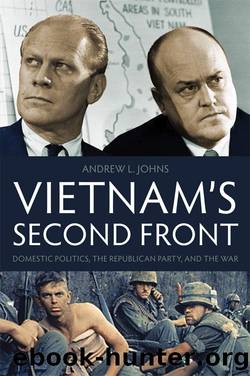Vietnam's Second Front by Andrew L. Johns

Author:Andrew L. Johns
Language: eng
Format: epub
Published: 2018-09-08T00:00:00+00:00
CHAPTER 7
The Icarus Agenda
Vietnamization and Its Political Implications
Our researchers into Public Opinion are content
That he held the proper opinions for the time of year;
When there was peace, he was for peace;
when there was war, he went.
—W. H. Auden, “The Unknown Citizen”
Politicians, after all, are not over a year behind Public Opinion.
—Will Rogers, The Autobiography of Will Rogers
Richard Nixon had dreamed of being president for decades. With his defeat of Hubert Humphrey, that ambition was finally realized. Yet, on assuming the mantle of the presidency, he discovered that the freedom to say and do as he saw fit that he had enjoyed as a nonincumbent no longer existed. The new president attempted to free himself from these restrictions through secrecy and misdirection but came to realize that the vagaries of domestic politics limited him to a fairly restricted set of options. He faced constraints analogous to those of Icarus, the son of the skilled craftsman Daedalus. Imprisoned with Icarus on the island of Crete by King Minos, Daedalus crafted wings to allow him and his son to escape. Daedalus warned Icarus not to fly too close to the sun or to the sea—the heat could melt the wax on the wings, and the water could weigh the wings down. In either case, he would be doomed. That narrow corridor proved too restricting for Icarus. Overcome by the joy of flight, he got too near to the sun, the wax melted, and he plummeted to his death. Like Icarus, Nixon had to navigate between the military and the political fronts, forced to grapple with domestic opinion in his effort to win the peace. This chapter will focus on Nixon's first year in office, examining how his Vietnamization policy evolved from the perspectives of the Nixon White House and the Republican Party, which for the first time since the Americanization of the conflict had direct influence on U.S. policy decisions in Vietnam.
Nixon often complained that he inherited a war not of his making. Vietnam, he claimed, resulted from the “faulty strategies” of his predecessors, the “‘architects’ of the mess” he faced when he assumed the presidency. 1 No one can deny that Eisenhower, Kennedy, and Johnson made the decisions that created the morass in Southeast Asia. But the new president's protests should not obscure a critical fact: Nixon undoubtedly contributed to the situation he confronted. His hawkish criticisms of the policies implemented by the two previous administrations, not to mention his vague and ambiguous campaign statements on the conflict, convey a significant measure of responsibility for the situation he encountered on 20 January 1969 both on the ground in Vietnam and at home. Nevertheless, Nixon entered the Oval Office with supreme confidence in his foreign policy expertise. As he told an interviewer in 1967, “I've always thought this country could run itself domestically, without a President. All you need is a competent Cabinet to run the country at home. You need a President for foreign policy.” 2 He firmly believed that he would
Download
This site does not store any files on its server. We only index and link to content provided by other sites. Please contact the content providers to delete copyright contents if any and email us, we'll remove relevant links or contents immediately.
| Arms Control | Diplomacy |
| Security | Trades & Tariffs |
| Treaties | African |
| Asian | Australian & Oceanian |
| Canadian | Caribbean & Latin American |
| European | Middle Eastern |
| Russian & Former Soviet Union |
The Secret History by Donna Tartt(19092)
The Social Justice Warrior Handbook by Lisa De Pasquale(12190)
Thirteen Reasons Why by Jay Asher(8912)
This Is How You Lose Her by Junot Diaz(6888)
Weapons of Math Destruction by Cathy O'Neil(6281)
Zero to One by Peter Thiel(5802)
Beartown by Fredrik Backman(5756)
The Myth of the Strong Leader by Archie Brown(5509)
The Fire Next Time by James Baldwin(5447)
How Democracies Die by Steven Levitsky & Daniel Ziblatt(5219)
Promise Me, Dad by Joe Biden(5154)
Stone's Rules by Roger Stone(5088)
A Higher Loyalty: Truth, Lies, and Leadership by James Comey(4964)
100 Deadly Skills by Clint Emerson(4926)
Rise and Kill First by Ronen Bergman(4790)
Secrecy World by Jake Bernstein(4753)
The David Icke Guide to the Global Conspiracy (and how to end it) by David Icke(4720)
The Farm by Tom Rob Smith(4514)
The Doomsday Machine by Daniel Ellsberg(4490)
